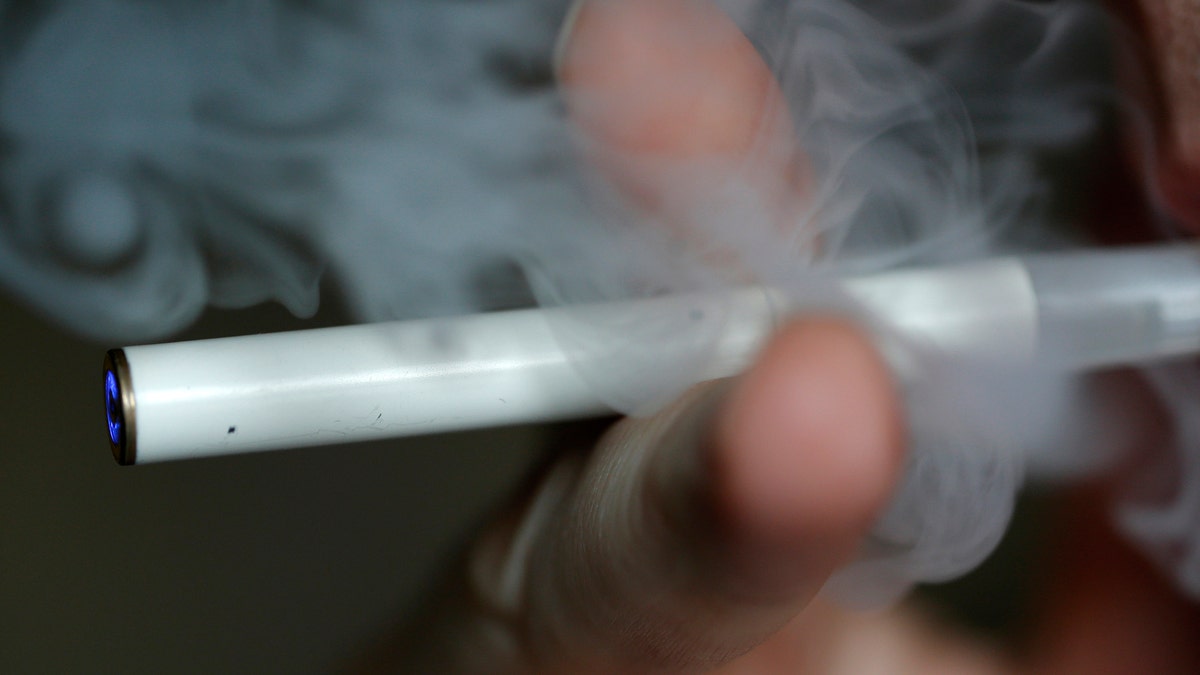
A man uses an E-cigarette, an electronic substitute in the form of a rod, slightly longer than a normal cigarette, in this illustration picture taken in Paris, March 5, 2013. A changeable filter contains a liquid with nicotine and propylene glycol. When the user inhales as he would when smoking, air flow is detected by a sensor and a micro-processor activates an atomizer which injects tiny droplets of the liquid into the flowing air, producing a vapour. The E cigarette is powered by a rechargeable battery. REUTERS/Christian Hartmann (FRANCE - Tags: HEALTH SOCIETY SCIENCE TECHNOLOGY) - RTR3ELVI (REUTERS/Christian Hartmann)
Are e-cigarettes safe during pregnancy?
As an OB-GYN, I get this question constantly. Especially from women who want to quit smoking during pregnancy, or who smoked in the past and may want to try e-cigarettes as a way to get the nicotine fix they still crave.
But before we hit on e-cigarettes, let’s recall some facts about the dangers of smoking.
When you see a commercial about the need to quit cigarettes, what do you usually see? A person who has been severely disfigured as a result of their smoking – someone who has lost limbs or undergone open heart surgery. Or a person left disfigured by operations to save them from throat or mouth cancer. At the end of the commercial, you see a graphic that says, “Smoking causes immediate damage to your body.”
And not only does smoking cause immediate damage – but it also causes long-term damage to your blood vessels, which can last for years after you quit.
Now, what can smoking do to a pregnancy? The risk factors for infants born to mothers who smoke can include low birth weight and learning disabilities. Smoking also carries the risk of miscarriage, preterm labor and even stillbirth.
How does smoking lead to all of these atrocities? Nicotine and other chemicals found in cigarettes have numerous negative effects on the small blood vessels of the placenta. The placenta is the organ responsible for bringing oxygen and nutrients from the mother to the baby during pregnancy – think of it as the baby’s lungs and lifeline in the womb.
When that tissue is exposed to toxins like nicotine, damage can be done – no matter how many cigarettes you smoked, or when you smoked them. Many patients tell me they decided to quit smoking once they confirmed their pregnancy. But nicotine still lingers in the body for one to four days after quitting, according to the American Cancer Society.
Many journals have documented the effects of nicotine on the placenta. In 2002, the American Journal of Obstetrics and Gynecology published a very important paper revealing the ill effects that smoking can have on the blood vessels and tissue of the placenta. And as far back as 1996, the American Journal of Epidemiology, in a very large study, demonstrated statistical evidence indicating that placentas of smokers had lesions characteristic of poor blood flow, which consequently had negative effects on newborns.
These effects on newborns can be cumulative, and are very difficult to prevent. In severe cases, the damage to placental function can be so acute that it can lead to premature separation of the placenta, which may cause perinatal complications. The National Institutes of Health (NIH) continues to grant millions of dollars in research to scientists trying to better understand the function of the placenta and how toxins, such as cigarette smoke, could lead to its dysfunction.
Now, back to the question I get from patients every day: Are e-cigarettes safe?
The overwhelming answer is: No, they are not safe.
E-cigarettes still expose your unborn child to nicotine, which we know is one of the main toxins implicated in placental damage. Furthermore, there are currently no regulations on e-cigarettes. In other words, many of the devices being sold containing liquid nicotine are very poorly controlled, and as a result, you might be exposing your unborn child to a much higher dose of nicotine than you would even find in a typical cigarette. Since you may think that e-cigarettes are safe, you may be doing this repeatedly.
Here’s the best advice I can give you: Never pick up smoking to begin with, because it takes a while for the chronic effects of cigarette smoking to go away. And if you already smoke, quit. Don’t replace cigarettes with e-cigarettes, especially during your pregnancy.








































